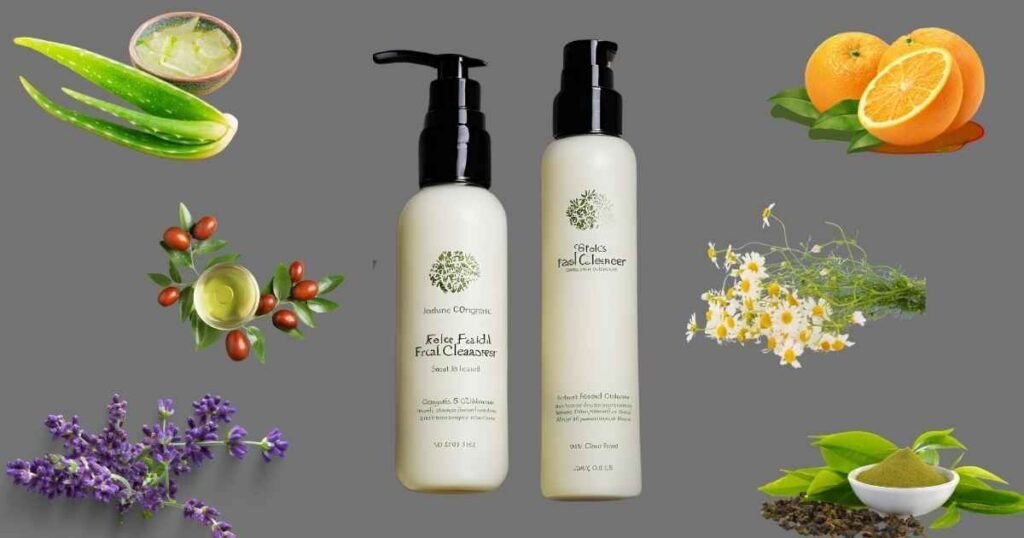Organic facial cleanser, often enriched with plant-based ingredients and free from harsh chemicals, stands out as a key player in this arena. When it comes to skincare, the buzzword “organic” is more than just a trend—it’s a movement toward healthier, more conscious beauty choices It is more than just a product; it’s a commitment to nourishing your skin naturally. Designed to gently cleanse the skin while preserving its natural balance, organic facial cleansers are becoming the preferred option for skincare enthusiasts and eco-conscious consumers alike. But what makes them special, and could they hold the secret to your healthiest skin yet? Here, we’ll break it all down.
The Importance of Using Organic Facial Cleansers
Switching to an organic facial cleanser may feel like a small change, but the benefits are significant for both your skin and the environment. Conventional skincare products are often loaded with synthetic chemicals like parabens, sulphates, and artificial fragrances that may strip your skin of its natural oils and, in some cases, cause irritation. Organic facial cleansers, on the other hand, are formulated with nature in mind, relying on botanical extracts, oils, and other plant-based ingredients to get the job done gently and effectively.
Why Organic Matters for Your Skin
Organic facial cleansers are packed with amino acids, antioxidants, and vitamins that improve the skin’s overall health. They actively work to remove daily build-up without compromising the skin’s integrity. Because they avoid harsh chemicals, they are less likely to irritate sensitive skin types and more likely to provide long-term benefits by promoting balance and rejuvenation.
For natural beauty advocates, this means a step closer to the radiant, healthy complexion they’re striving for. Your skin absorbs everything you apply to it, so using products free of toxic chemicals ensures you’re feeding your skin only what nurtures it.
A Win for the Planet
Beyond individual skin health, organic facial cleansers also reduce the environmental footprint of beauty routines. Chemical-heavy cleansers often contribute to water pollution and can negatively impact ecosystems. Choosing an organic option aligns your skincare habits with your values, empowering eco-conscious consumers to contribute to a more sustainable world.
Key Ingredients in Organic Facial Cleansers

Your skin deserves nothing but the best, and that’s exactly what organic facial cleansers aim to offer. Unlike conventional cleansers that rely on harsh detergents, organic options contain a thoughtfully curated blend of natural ingredients with proven benefits for skin.
Spotlight on Plant-Based Powerhouses
- Aloe Vera: Known for its soothing properties, aloe vera hydrates the skin while reducing inflammation.
- Green Tea Extract: Packed with antioxidants, it helps fight free radicals and rejuvenate the skin.
- Jojoba Oil: Mimicking the skin’s natural oils, jojoba effectively cleanses without clogging pores, making it perfect for acne-prone skin.
- Chamomile: Calming and anti-inflammatory, it reduces redness and is ideal for sensitive skin.
- Lavender Oil: Beyond its heavenly aroma, lavender oil boasts antibacterial and healing properties that nurture troubled skin.
- Activated Charcoal: Offering deep cleansing without stripping the skin, activated charcoal is a favourite for unclogging pores and detoxifying.
Each ingredient is purpose-driven, working harmoniously to cleanse, nourish, and replenish the skin, making organic facial cleansers the ultimate multitasks.
How Organic Facial Cleansers Work
At the heart of every organic facial cleanser is the ability to cleanse thoroughly without compromising the skin’s health. But how do they manage to be so gentle yet effective? Unlike synthetic cleansers, organic options are designed to align with your skin’s natural balance.
Gentle Yet Mighty Cleansing
The key lies in their unique formulations. Organic facial cleansers often feature surfactants derived from coconut or sugar that lift dirt and oil without stripping the skin of its natural protective barrier. This ensures that your skin remains hydrated and balanced, even after cleansing.
The Role of pH Balance
One of the less talked about but crucial aspects of organic facial cleansers is their ability to maintain a pH level that supports the skin’s natural defence mechanism. Conventional cleansers can disrupt this balance, leading to dryness, irritation, or even breakouts. An organic formula, however, respects this equilibrium, allowing the skin to function and regenerate optimally.
Choosing the Right Organic Facial Cleanser for Your Skin Type
Selecting the right organic facial cleanser is as much about understanding your skin as it is about scrutinizing ingredient labels. Different skin types require different care, but the world of organic beauty has options for everyone.
Match Your Cleanser to Your Skin
- Oily Skin: Seek cleansers with ingredients like clay or activated charcoal that help regulate sebum production without over-drying.
- Dry Skin: Look for rich, creamy formulas with hydrating ingredients like shea butter or aloe vera.
- Combination Skin: Opt for balancing formulas enriched with jojoba oil or chamomile extracts.
- Sensitive Skin: Stick to ultra-gentle options with calming agents like calendula or lavender.
Decoding Product Labels
Understanding what’s on the bottle can make all the difference. Look for certifications such as USDA Organic or Ecocert to confirm the cleanser meets strict organic standards. Steer clear of ingredients that may sound natural but are chemically altered, like “natural fragrance” (often code for synthetic ingredients).
Tips for Incorporating Organic Facial Cleansers into Your Skincare Routine
Start with a Patch Test
Before fully introducing an organic facial cleanser into your routine, perform a patch test on a small area of your skin. This helps ensure that the product is compatible with your skin type and avoids potential irritation.
Choose a Cleanser for Your Skin Type
Just like conventional cleansers, organic options come in different formulations tailored to specific skin types. Whether you have oily, dry, combination, or sensitive skin, select a cleanser designed to address your unique needs.
Use Lukewarm Water
When using an organic cleanser, always wash your face with lukewarm water. Hot water can strip your skin’s natural oils, while cold water may not effectively remove impurities.
Follow with a Toner
After cleansing, use a natural or organic toner to balance your skin’s pH level and prep it for further skincare products. Organic toners often contain soothing ingredients like rose water or witch hazel.
Adopt a Consistent Routine
To achieve the best results, incorporate your organic facial cleanser into a daily routine. Cleansing your face twice a day—once in the morning and once at night—helps maintain clean and healthy skin.
Pair with a Moisturizer
After cleansing, always follow up with a moisturizer to lock in hydration. Consider using an organic moisturizer to complement the benefits of your cleanser and keep your skincare routine eco-friendly.
Store Properly
Keep your organic cleanser in a cool, dry place, away from direct sunlight. Organic products often contain fewer preservatives and may require proper storage to maintain their effectiveness and shelf life.
By following these tips, you can maximize the benefits of organic facial cleansers while creating a skincare routine that promotes both healthy skin and environmental sustainability
Must read: Faqlogin.com Home Improvement: Increasing Home Value
Common Misconceptions about Organic Skincare
One of the biggest myths about organic facial cleansers is that they aren’t as effective as their chemical-laden counterparts. However, countless consumers and clinical studies prove otherwise.
Another misconception is that organic products are too expensive. While some premium options come with a higher price tag, the long-term benefits—for both your skin and your conscience—make them a worthwhile investment.
The Future of Organic Beauty
The organic beauty industry is growing rapidly, with constant innovations in cleaner and greener formulations. From probiotic-infused cleansers to zero-waste packaging, the future is bright—and sustainable.
You’re Step toward Healthier Skin
An organic facial cleanser is more than just a product; it’s a commitment to healthier, more radiant skin. Take the leap into organic beauty today and experience the transformation for yourself. Your skin—and the planet—will thank you.
Benefits of Using Organic Facial Cleanser
1. Gentle on the Skin
Organic facial cleansers are formulated with natural, plant-based ingredients, making them gentler on the skin compared to products with harsh chemicals. They are less likely to cause irritation, redness, or dryness, especially for those with sensitive skin.
2. Free from Harmful Chemicals
Many conventional cleansers contain synthetic fragrances, sulphates, parabens, and other potentially harmful substances. Organic options avoid these chemicals, reducing the risk of long-term skin damage and maintaining the skin’s natural balance.
Safe for Daily Use
Because organic cleansers are free from harmful additives, they can be used daily without stripping the skin of its natural oils, leaving it nourished and healthy.
3. Rich in Nutrients
Organic facial cleansers are often packed with vitamins, antioxidants, and essential oils. These nutrients help protect the skin from environmental stressors while promoting a radiant and youthful complexion.
4. Environmentally Friendly
Using organic skincare products supports eco-friendly practices. Sustainable farming methods, biodegradable packaging, and the absence of harmful chemicals in production contribute to a cleaner planet and a reduced carbon footprint.
Cruelty-Free
Most organic brands prioritize ethical practices, such as being cruelty-free and avoiding animal testing, making them an ethical choice for conscientious consumers.
5. Suitable for All Skin Types
Organic cleansers are versatile and suitable for a wide range of skin types, including dry, oily, combination, and acne-prone skin. Ingredients are carefully selected to cater to specific skin concerns without causing further issues.
By choosing an organic facial cleanser, you not only prioritize your skin’s health but also make a positive impact on the environment and support ethical beauty practices. It’s a win-win for everyone.
How Do Organic Facial Cleansers Differ from Conventional Ones?
Organic facial cleansers differ from conventional ones primarily in their ingredient composition and overall approach to skincare. Organic cleansers are formulated using natural, plant-based ingredients that are often grown without synthetic pesticides or harmful chemicals. Unlike conventional cleansers, they avoid synthetic additives such as parabens, sulphates, and artificial fragrances, which can be harsh on sensitive skin.
Additionally, organic cleansers focus on maintaining the skin’s natural balance, often incorporating nourishing oils and botanical extracts to hydrate and soothe the skin. This makes them a gentler and more environmentally friendly choice compared to many conventional alternatives, which may rely on synthetic formulations and harsh surfactants for their cleansing effects.
Types of Organic Facial Cleansers
When it comes to organic facial cleansers, there are various types designed to suit different skin needs and preferences. Some common types are:
Gel Cleansers
Gel cleansers are lightweight and often infused with natural ingredients like tea tree oil or aloe vera. They are ideal for oily and acne-prone skin, as they help remove excess oil and unclog pores without stripping the skin of its natural moisture.
Cream Cleansers
Cream cleansers are rich and hydrating, perfect for dry or sensitive skin. Often containing ingredients like shea butter, chamomile, or coconut oil, they gently cleanse the skin while providing nourishment and a soothing effect.
Oil Cleansers
Made with natural oils such as jojoba, argan, or sunflower oil, these cleansers effectively dissolve makeup, sunscreen, and impurities. They are suitable for all skin types, including oily skin, as they balance natural oils and leave the complexion feeling soft and hydrated.
Micellar Water
Micellar water combines cleansing oils and water to create tiny micelles that attract dirt and makeup. It’s gentle, convenient, and suitable for all skin types, making it a popular choice for quick, low-maintenance cleansing.
Powder Cleansers
These innovative cleansers are made from finely milled powders, such as rice or oats, combined with natural enzymes or botanicals. When mixed with water, they create a paste that gently exfoliates and cleanses, making it a great option for those seeking a deeper cleanse.
Foam Cleansers
Foam cleansers are lightweight and airy, often formulated with natural plant extracts like green tea or lavender. They are particularly effective for combination or oily skin, offering a refreshing cleanse while balancing the skin’s oil production.
Each type of organic facial cleanser offers unique benefits, ensuring that there’s an option for every skin type and concern. With these choices, you can find a cleanser that aligns with both your skincare goals and your preference for natural, eco-friendly beauty products.
Famous Organic Facial Cleansers
When it comes to organic facial cleansers, a few brands stand out for their quality, effectiveness, and dedication to natural skincare. One such popular option is Tata HarperPurifying Cleanser, which combines natural botanical ingredients like broccolini and neroli with gentle exfoliation to detoxify the skin. Another highly acclaimed product is Dr. Bronner’s Pure-Castile Liquid Soap, a versatile cleanser made with organic oils such as coconut, olive, and hemp, suitable for both face and body.
Juice Beauty Cleansing Milk is another favourite, harnessing the power of organic grape juice and aloe vera to soothe and hydrate sensitive skin. These products showcase the diversity and innovation within the organic skincare industry, delivering results without compromising on eco-friendly and ethical practices.
Overall, organic facial cleansers offer a multitude of benefits for both the skin and the environment. With various types to choose from and reputable brands offering effective options, incorporating an organic cleanser into your skincare routine is a simple yet impactful step towards healthier, more sustainable beauty habits.
How to Use and Apply Organic Facial Cleanser
Using an organic facial cleanser effectively involves a few simple but essential steps to ensure your skin reaps the full benefits. Start by rinsing your face with lukewarm water to help open up your pores and prepare your skin for cleansing. Dispense a small, dime-sized amount of cleanser into your hands, and gently work it into a lather if the formula allows. Massage the cleanser on your face in circular motions by using your fingertips, focusing on areas prone to oil build up or impurities, such as the T-zone.
Be sure to avoid scrubbing too harshly, as this can irritate the skin. Rinse thoroughly with lukewarm water to remove any residues, and pat your face dry with a clean, soft towel. Follow up with a moisturizer or serum to lock in hydration and maintain your skin’s balance. For optimal results, use your organic facial cleanser twice daily, morning and evening, as part of your skincare routine. Always pair usage with sunscreen during the daytime to protect your skin from UV damage.
Application of Organic Facial Cleanser in beauty industry
- Natural Ingredients: Organic facial cleansers are favoured in the beauty industry for their use of natural, plant-based ingredients, which are gentle on the skin and free from harsh chemicals.
- Eco-Friendly: These cleansers align with sustainable practices, appealing to environmentally conscious consumers by minimizing synthetic additives that may harm the planet.
- Skin Benefits: They are tailored to nourish the skin, help maintain its natural pH balance, and reduce the risk of irritation or allergic reactions, making them suitable for all skin types.
- Market Demand: The rising trend of clean beauty has driven the demand for organic facial cleansers, positioning them as key products in skincare lines for brands.
- Customizable Formulas: Many brands offer cleansers with ingredients targeting specific skin concerns, like acne, dryness, or sensitivity, enhancing their appeal to diverse customer needs.
- Luxury Appeal: Often seen as premium products, organic facial cleansers contribute to the perception of a high-end, effective skincare routine.
- Ethical Marketing: Certifications like cruelty-free and fair trade further boost the appeal of organic cleansers within ethical consumer markets.
Conclusion
Organic facial cleansers have become a staple in the modern skincare industry due to their environmental, ethical, and skin-friendly benefits. By addressing the growing demand for clean beauty and offering formulations that cater to a wide range of needs, these products continue to establish their prominence. For brands and consumers alike, investing in organic facial cleansers not only promotes healthier skin but also supports a more sustainable and ethical approach to self-care.
FAQs About Organic Facial Cleansers
What are the benefits of using an organic facial cleanser?
Organic facial cleansers are gentle on the skin, free from harsh chemicals, and made with natural ingredients that are usually biodegradable and eco-friendly. They can help maintain healthy skin while being kind to the environment.
Are organic facial cleansers suitable for all skin types?
Yes, many organic cleansers are formulated for various skin types, including sensitive, oily, dry, and combination skin. Be sure to choose a product that is specifically tailored to your skin’s needs.
Do organic facial cleansers help with acne?
Certain organic cleansers contain ingredients like tea tree oil or aloe vera, which are known for their antibacterial and soothing properties. These can help reduce acne and calm irritated skin.
Why are organic facial cleansers more expensive than regular ones?
Organic products often use high-quality, sustainably sourced ingredients and undergo rigorous certification processes, which can increase production costs. Additionally, they avoid the use of cheaper synthetic chemicals.
Can organic facial cleansers expire?
Yes, because they do not use synthetic preservatives, organic cleansers typically have a shorter shelf life. Always check the packaging for the expiration date and store them properly.
How do I know if a facial cleanser is truly organic?
Look for certifications like USDA Organic, COSMOS Organic, or similar labels that verify the product meets strict organic standards. Reading the ingredient list can also provide insight.
Do organic facial cleansers foam like regular ones?
Some may not foam as much because they do not contain synthetic surfactants, but they are still effective at cleansing the skin without stripping its natural oils.
Can I use an organic facial cleanser every day?
Yes, organic facial cleansers are generally gentle enough for daily use. However, it’s important to follow the instructions on the product packaging to ensure proper use.
Are organic facial cleansers eco-friendly?
Most organic facial cleansers are made with biodegradable ingredients and come in sustainable packaging, making them a better choice for the environment.
What should I look for in an organic facial cleanser?
Focus on ingredients that suit your skin type and address your specific concerns. Avoid cleansers with synthetic fragrances or alcohol if you have sensitive skin, and look for nourishing elements like plant extracts or essential oils.
Read More: Angela Peery Delta Airlines :Redefines Modern Aviation
.






